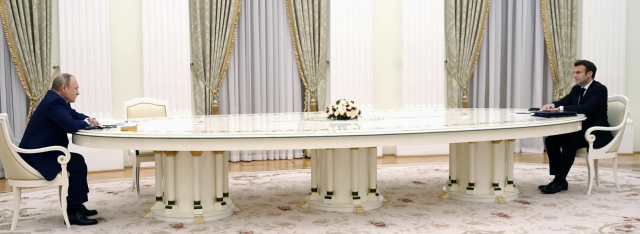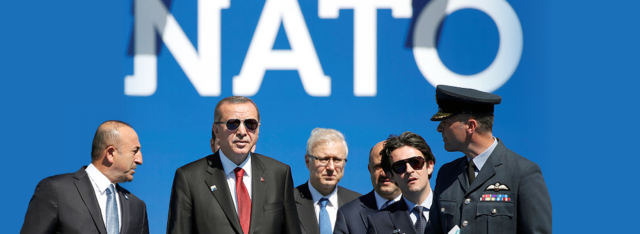
- Policy Analysis
- Interviews & Presentations
The Ukraine War & the Middle East One Year On

In a series of policy articles, media presentations, and media appearances, Washington Institute scholars discuss what could lie ahead for Ukraine, the Middle East, and the world as the war enters its second year.
A year ago, the Russian military poured across the border into Ukraine, sparking the largest, most deadly land war Europe has seen since World War II. Its implications stretch far beyond the continent.
“When Russia began its effort to conquer Ukraine a year ago, there was every reason to believe the end result would be disastrous for the West,” writes Lane-Swig Senior Fellow Michael Singh. “Yet it has gone far better for Ukraine than any could have hoped at this time last year, thanks both to Ukrainian bravery on the battlefield and the home front, and a perhaps surprising level of Western resolve and material assistance.”
Singh, who is both the Institute’s managing director and interim director of its Diane and Guilford Glazer Foundation Program on Great Power Competition and the Middle East, adds that the war could help the West prepare for or prevent the next great power conflict.
Middle East nations were quickly drawn in to the Ukraine war and took sides based on their national interests. Iran and Russia have become closer than ever before. Turkey and Israel have maintained a delicate balancing act between Kiev and Moscow. Gulf nations have deepened relations with Moscow over oil and gas production. Meanwhile, disruptions in the wheat and grain supply chain have caused food shortages in several Middle East and North African countries.
In a series of articles, multimedia presentations, and media appearances, Institute experts discuss what could lie ahead for Ukraine, the Middle East, and the world as the war enters its second year.

What Is Putin's Endgame?
Since the war began, the fighting has taken a heavy toll on Russia’s military, and Moscow has been pushed into isolation as the West imposed steep sanctions and boycotts. Despite this, Russian president Vladimir Putin remains defiant and shows no signs of backing down.

In her recent analysis, Institute senior fellow Anna Borshchevskaya, Washington’s top expert on Russia in the Middle East, argues that “only Russia’s decisive loss on the battlefield will bring this conflict to a complete end. All wars are ultimately settled through diplomacy, but unless Russia undergoes a process of fundamental internal reckoning with itself, Russia’s elites will not let go of their imperial impetus to control Ukraine that originates in the very founding of the Russian state.”
Even if a peace settlement is reached before the Russian military is defeated, it “will only doom Ukraine to face another Russian attack years later, after the Russian military has had time to regain its strength.”
Borshchevskaya argues that Putin’s motives, and possible future course, may be seen in his intervention in Syria. Throughout the war in Ukraine, Putin has been recycling several moves from his Syria playbook. Borshchevskaya's Putin's War in Syria: Russian Foreign Policy and the Price of America's Absence has proved to be a vital resource throughout the Ukraine war. The 2021 work looks at Russia's strategic calculus and Putin’s actions in Syria, arguing that Russia’s relative success allowed it to later springboard operations across the Mediterranean, and even employ them in Ukraine.
For more on Russia's strategy, view Anna Borshchevskaya's recent policy analysis
Russia and Iran: Closer Than Ever
"Tehran apparently saw an opportunity to make itself indispensable to the world’s biggest nuclear power and reap economic, technological, political, and military rewards."
Increasingly facing international isolation, Iran and Russia have expanded ties substantially since the war started, with Iran becoming Russia's "top military backer."

"Tehran apparently saw an opportunity to make itself indispensable to the world’s biggest nuclear power and reap economic, technological, political, and military rewards,” Iran expert and Institute senior fellow Henry Rome writes.
Reports suggest that this relationship transcends mere transactionalism and represents a deepening of ties in the high-tech and defense sectors. Institute fellows Louis Dugit-Gros, Anna Borshchevskaya, Michael Eisenstadt, Farzin Nadimi, and Henry Rome argue that Russian aid could help Tehran promote repression at home and instability abroad, so the United States and its allies should seek to deter such collaboration wherever possible.
Read their recommendations here.
For more on Iran-Russia Relations, view Henry Rome's policy analysis

Turkey Delays NATO Expansion
Finland and Sweden applied to join NATO together in May 2022, but Turkish president Recep Tayyip Erdogan has resisted Stockholm’s bid on the grounds that Sweden is serving as a safe haven for forces that threaten Turkey’s national security. Finland now has decided to apply separately.
But even Finland’s bid may be delayed as the Turkish government grapples with the devastation of the country’s recent earthquake. The issue is the bandwidth the Turkish parliament has to spare, says Beyer Family Fellow Soner Cagaptay, the director of the Institute's Turkish Research Program.

The Institute hosted a virtual forum to discuss the political and policy consequences of the still-unfolding humanitarian crisis in Turkey and Syria. At the event, Cagaptay explained how the response from several European nations, including Sweden, will likely reset much of the Turkish public’s mindset positively toward the European Union, NATO, and the broader West.
For now, Cagaptay concludes, “It is too early to assess Turkey’s likely political trajectory post-earthquake, since the full scope and consequences of the destruction will not become clear for some time.”
For more on Turkey, view Soner Cagaptay's recent policy analysis
Israel’s Balancing Act
"It is no secret that the Ukrainians want Israeli air defense systems, particularly Iron Dome."
The war in Ukraine has forced Israel into a delicate balancing act between maintaining its ties to Russia and supporting its allies in defending Ukrainian sovereignty. Israel has faced criticism from some in the West for not doing enough to assist Ukraine against Russian aggression.

Thus far, Israel has supplied Ukraine with humanitarian and nonlethal assistance as well as intelligence about Iranian drones, “but it is no secret that the Ukrainians want Israeli air defense systems, particularly Iron Dome,” writes Ziegler Distinguished Fellow David Makovsky, the director of the Institute's Koret Project on Arab-Israel Relations.
Makovsky explains that Israel is deeply concerned about increased military cooperation between Russia and Iran. Israel believes Iran will seek weapons and strategic requests from Moscow in return for providing drones to Russia. Makovsky expects Israeli prime minister Binyamin Netanyahu to publicly ask Russian president Vladimir Putin “not to give Tehran strategic weapons or assistance,” talks that will likely cause friction with Washington. Therefore, Makovsky advises, “U.S. and Israeli officials should privately establish clear ground rules for such high-level dialogue in advance.”
For more on Israel, view David Makovsky's recent policy analysis

Changes to the Energy Market
Over the past year, the Middle East has increased gas sales to Europe as the latter sought to wean itself from Russian energy. OPEC+, the oil-producing consortium in which Russia is a member, met virtually at the start of this month, announcing no change to its existing production policy. Baker Fellow and director of the Institute's Bernstein Program on Gulf and Energy Policy Simon Henderson points out in an op-ed for The Hill that the meeting outcome was influenced by Russian president Vladimir Putin’s last-minute phone call with the OPEC kingpin, Saudi Arabia’s Crown Prince Muhammad bin Salman, in which the two leaders discussed “cooperation within the group…in order to maintain oil price stability.”

“Whatever Putin’s motives are, they are unlikely to be as charitable as 'maintaining oil price stability.' Winning the war in Ukraine...as well as punishing the West for opposing him while sending increased and better weapons to Ukraine are surely near the top of Putin’s agenda,” Henderson writes.
For more on Gulf and energy policy, view Simon Henderson's recent policy analysis
Worsening Economic Woes
"The United States could still pull Egypt away from Russia by offering additional incentives if the crisis worsens."
The Russian invasion of Ukraine a year ago highlighted Moscow’s grip on food security around the world, especially in the Middle East and North Africa, where already high pandemic-era prices soared higher still. Even as the UN-brokered Black Sea Grain Initiative (BSGI) is in place to keep food flowing to the rest of the world, the amount of grain leaving Ukraine has declined in recent weeks.

A few months ago, Institute experts predicted how Russia would likely undermine the deal and how the West should respond. Institute fellows Anna Borshchevskaya, Louis Dugit-Gros, and Sabina Henneberg argue that the West must prepare accordingly to address the risk of global recession. “Plans must be made to address these effects sooner rather than later,” they assert.
Import-dependent economies like Egypt are still feeling the effects. Egypt’s economy has reached a new low, according to senior fellow Ben Fishman. “The twin shocks of the COVID-19 pandemic and the Ukraine war disproportionately affected the country due to its heavy reliance on threatened resources such as wheat and tourism revenue from Russia and Ukraine,” he explains. As a result, Egypt has remained mostly neutral on the Ukraine war to avoid provoking Russia. “The United States could still pull Egypt away from Russia by offering additional incentives if the crisis worsens,” Fishman writes.
For more on North Africa, read Sabina Henneberg's recent policy analysis
Additional Resources



